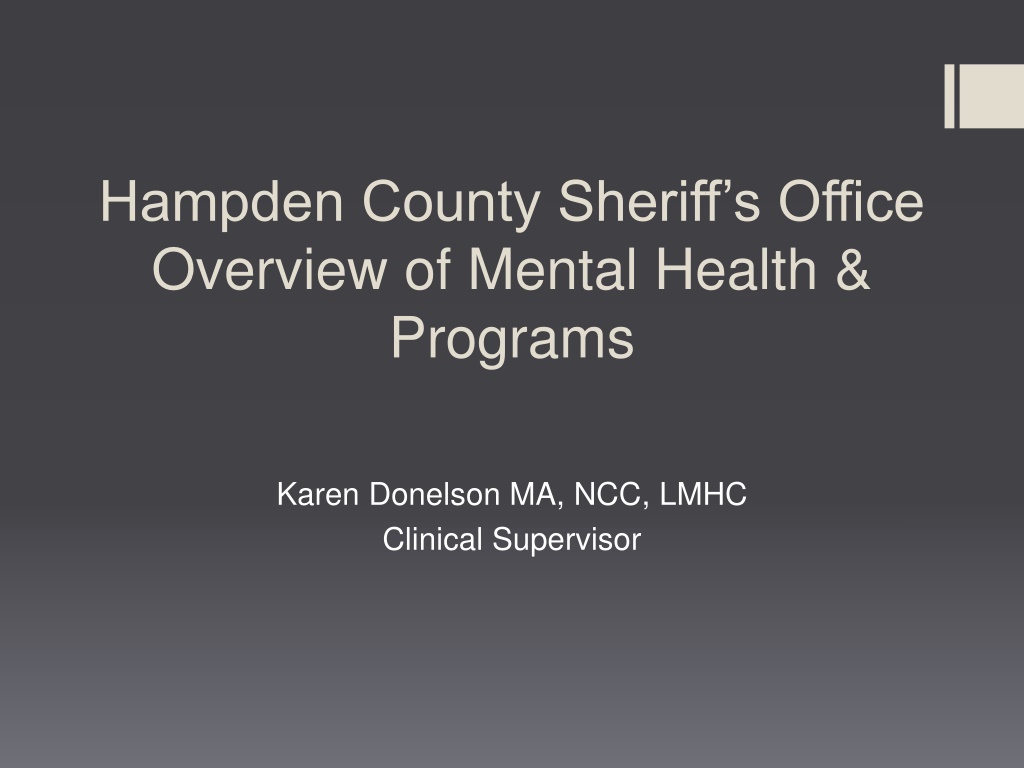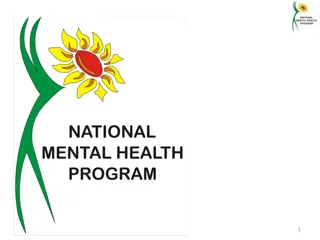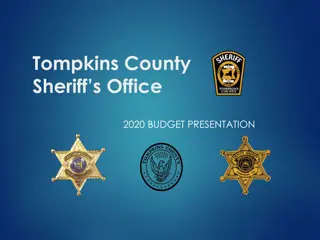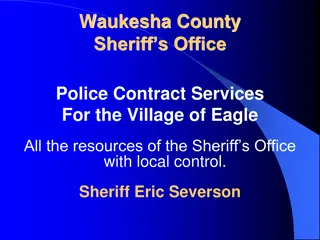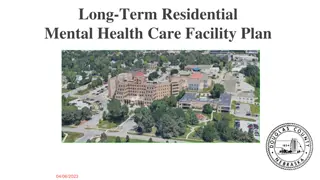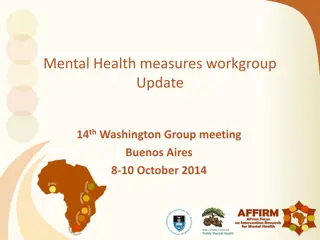Mental Health Services Overview at Hampden County Sheriff's Office
Hampden County Sheriff's Office provides a comprehensive range of mental health services and programs for individuals in custody. These services include suicide prevention, evaluation and stabilization units, specialized units, educational and treatment programs, and more. The staff collaborates to support positive outcomes through clinical supervision and meetings with unit management. The clinical team, led by Karen Donelson, works to provide outpatient and inpatient mental health services, including psychiatric evaluation and medication management. Clinicians conduct various assessments, referrals, and treatment planning based on the individual's needs within the different facilities of the Sheriff's Office.
Download Presentation

Please find below an Image/Link to download the presentation.
The content on the website is provided AS IS for your information and personal use only. It may not be sold, licensed, or shared on other websites without obtaining consent from the author. Download presentation by click this link. If you encounter any issues during the download, it is possible that the publisher has removed the file from their server.
E N D
Presentation Transcript
Hampden County Sheriffs Office Overview of Mental Health & Programs Karen Donelson MA, NCC, LMHC Clinical Supervisor
Overview Hampden County sites Mental Health Services Suicide Prevention & Intervention Evaluation and Stabilization Units Specialized Units at HCSO Educational and Treatment programs Stonybrook Stabilization Center (Section 35)
Four Secure Sites of HCSO Hampden County Correctional Center (Main Institution) Ludlow MA Western MA Regional Women s Correctional Center Chicopee MA (Serving Worcester West exception Franklin) Western Massachusetts Recovery and Wellness Center Springfield MA (Local, DOC step-down & Federal step- down) Stonybrook Stabilization Treatment Center Ludlow MA (Section 35)
Open Mental Health Cases Facility # in Custody Open w/ MHS Percentage w/ MHS Main Institution WCC WMRWC SSTC TOTALS 682 151 83 107 916 430 113 43 90 586 63.05% 74.83% 51.81% 84.11% 63.97% *Daily count and MH Numbers as of 11/28/23
Collaborative Approach Mental Health Staff work collaboratively all HCSO Staff, including attending Clinical Supervision and Classification Meetings with Unit Management, Correctional Counselors, and Correctional Case Workers. When people better understand the dynamics and interventions that support their clients, it increases the likelihood for positive outcomes to those we serve.
Mental Health Services Clinical Director: Erin Lajeunesse Clinical Manager: Danielle Mimitz Clinical Supervisor: Karen Donelson (MI) / Lauren Murphy (WCC) Program Director: Melissa Hughes (SSTC) Outpatient Services: Pod based clinicians Psychiatry/Medication Management Inpatient Services: ESU Counselors Psychiatric Medication Evaluation/Management
Outpatient Mental Health Services Mental Health Clinicians work on an outpatient basis within the facilities conducting: Emergency/RISK Assessments Admissions to the ESU/ESP Non-emergency Assessments -Screenings to determine if someone needs mental health services Intake/Diagnostic Assessments referrals to psychiatry / MAT prescriber Follow-up Visits Treatment Planning Aftercare Planning Each facility is assigned clinicians based on caseload size and acuity: MI 11 clinicians assigned WCC 3 clinicians assigned WMRWC 1 floating clinician assigned to Mill/SSTC SSTC 3 clinicians assigned, w/1 floater
MH: Screening for Referrals Booking/Intake - screened for recent /past suicide attempts or current Suicidal Ideation (SI). Intake Nurse MH Screen, history of treatment (community based as well as past MH care at HCSO), history of suicide attempts/NSSI, and verify if the inmate has any current Psychotropic Medications. Orientation Units meeting with CCW; Officer or Security Supervisor referral. Re-entry starts at intake
Suicide Prevention at HCSO It is the policy of the Hampden County Sheriff s Office to effectively monitor all inmates for the potential for self-harm and suicidal behavior. All staff are trained in warning signs, major risk factors and mental health referrals; coupled with their experience and knowledge of inmate behavior. This combination can have a positive impact on reducing these incidents.
Suicide Prevention & Intervention Suicide Prevention Committee 8 hour suicide prevention training for incoming academies 1 hour initial suicide prevention training for all new staff Ongoing annual trainings in suicide prevention for all staff employed by HCSO On-going Screening for Suicidality and need for MH referrals by HCSO Staff
Safety Precautions Suicide Prevention/Intervention Restraint Bed/Suicide Resistant Cell Restrictive Housing Admit to ESU Remain RISK or Partially Clear w/ re- evaluation every 24 hours until disposition is reached Clear Precautions Safety Smock/Blanket
Evaluation & Stabilization Unit (MI) The ESU (Evaluation & Stabilization Unit) is a maximum security inpatient treatment unit for individuals requiring short-term intensive psychiatric evaluation and treatment. We have one of the 2 ESU s in the state, the other is located in Middlesex County. This is a regional program and patients can be admitted from the following counties for stabilization then returned to their county: Worcester Hampden Hampshire Berkshire Franklin This is a 15 bed inpatient unit w/ 3 restraint beds available. There are an additional 16 beds on the top-tier to utilize for respites and step-down patients.
ESU Level System & Admissions Utilize a Level Based system while providing treatment: Reasons for Admission: Thoughts to harm others or oneself. Attempts to harm others or oneself. Struggling to manage in current housing unit. Increase in symptoms. Medication evaluations. Unclear diagnoses. Bizarre Behavior. Level I w/ 1:1 observation Level I Level II Level III Step-down Respites
Mental Health Unit The MHU is a medium security housing unit designed to provide enhanced treatment for individuals living with a mental illness. Mental Health Staff and unit Staff utilize a Trauma Informed approach. With this approach, we treat all individuals with the assumption that they have experienced some type of trauma without needing to know the details of their past.
Mental Health Unit (MI) HCSO MHU houses inmates with serious and persistent mental illness who have difficulty functioning in a general population unit. This is a 39 bed unit. These individuals typically receive care thru DMH, or meet criteria for DMH Services. Unit staff include MH Clinician, Correctional Counselor, and a Correctional Case Worker. MH Counselors offer psycho-educational groups. This unit is run like a general population unit in terms of privileges.
Evaluation & Stabilization Unit/ MHU (WCC) The ESU (Evaluation & Stabilization Unit) is a maximum security inpatient treatment unit for individuals requiring short-term intensive psychiatric evaluation and treatment. Mixed Classification unit, MHU is located on the top tier. We have the only ESU in the state, for justice-involved Women. This is a regional program and patients can be admitted from the following counties for stabilization then returned to their county: Franklin ESU: 11 bed inpatient unit MHU: 12 bed living unit
Evaluation & Stabilization Program This is a program that we utilize at Stonybrook Stabilization and Treatment Center (SSTC) as there is no specific unit, currently, set aside at these facilities to have an ESU. SSTC does have a MHU and they house ESP clients in the same area as well as 3 other areas if needed. The ESP program follows the same leveling system that we follow on the ESU.
Opioid Treatment Program & Medically Assisted Treatment Methadone was delivered to York Street Jail (Springfield, MA) daily via Providence Hospital staff to treat opioid addiction; this practice began in the late 1980 s and continued through the early 90 s Methadone for pregnant women, 1993 Buprenorphine Main Institution, 2007 Vivitrol HCSD participated in a study, Project New Hope, with Yale University, 2011 Vivitrol MAT Pilot Western Massachusetts Correctional Alcohol Center, Springfield, MA, 2013 Opioid Treatment Program (OTP), offering Buprenorphine (Subutex), Methadone, and Naltrexone (Vivitrol) September 1, 2019
OTP Services at HCSO July 2023 OTP services transitioned from CODAC to HCSO s Mental Health Services. BHN continues to provide OTP Discharge planning: Continuation Seen within 5-7 days of intake New Induction After being seen by a MH Clinician client is referred to Med Provider; Discharge Planner meets within 5 days before the Provider meeting Pre-Trial & Sentenced on OTP Seen within 5 days before court, within 5 days after if return from court (pre-trial) Bridge Works with clients in their last six months of incarceration Bi-weekly check-ins; weekly in the month before release
OTP Education All patients enrolled in the OTP are required to attend OTP Education Groups are facilitated by the Care Coordinators Group education occurs twice a week for five weeks Topics include Orientation to the Opioid Treatment Program Treatment Team Substance Use Disorders & Compulsive Behaviors Overdose Prevention Medication for Opioid Use Disorder Options Substance Use Treatment & Chronic Illness/conditions Substance Use Disorder Treatment for individuals with Co-Occurring Disorders Family and Relationships within Recovery Pathways of Recovery Relapse Prevention & Recovery Maintenance Plans
OTP Discharge Planning Frequency of Discharge Planner Sessions Population Within 2 business days of referral Within 5 days prior to Court Date Within 5 days after Court Date Otherwise, every 30 days Pre-Trial Within 5 days from referral Every 30 days Once 60 days to potential release, every 2 weeks Within 5 days prior to release Sentenced Within 5 days from referral Every 2 weeks S35
Keeping Track with OTP Assistant Database developed by HCSO to monitor: o Dosing o Appointments o Referrals o Upcoming items due (forms/assessments) o Outside appointments upon release o Statistics
Specialty Unit: Youthful Offenders Goal: To reduce the likelihood of recidivism by addressing the unique issues associated with Juvenile or Youthful Offenders including emotional abuse, physical abuse, sexual abuse, emotional neglect, physical neglect, family violence, household substance abuse, household mental illness, parental absence, and household member incarceration.
Youthful Offender Unit MAGIC Program Mission To promote and encourage youth towards their next steps in personal development through a supportive, relational program that helps interrupt beliefs, attitudes, habits, and behaviors supportive of a criminal lifestyle in favor of productive and positive futures. Meaningful Accomplishments Gain Increased Character Your thoughts determine your actions.
Educational and Treatment Programs GED College Courses offered Institutional jobs Maintenance, welding, carpentry, graphics, prison industries At Minimum Security this may include community based work crew (Springfield Parks, Old Armory Grille, Tree Services program). Psycho-educational Treatment programs/classes: SAVR: Stress Anger Violence Reduction Self-regulation, behavior regulation, how to manage emotional reactivity with goal of improving personal well-being and compassion for others Yoga/Mindfulness CBT Skills Healing Trauma Anger Management Substance Use Units
Emotional Support Division In addition to Molly, there are 3 other Emotional Support Animals that are assigned to different areas of the Department (Training, Medical, and Security) Pet Therapy started in October 2020 at the Main Institution with individuals classified to Mental Health Unit/Admitted to Inpatient level of care. Clients are provided with the opportunity to have individual treatment sessions with Molly when completing a mental health evaluation. Animal Assisted Treatment Groups include: WCC for V.O.I.C.E.S participants. Roles of Emotional Support Animals include: Providing a therapeutic environment for the inmates at all HCSO facilities Giving the staff of HCSO the ability to interact with Therapy Dogs Provide community outreach at schools, hospitals, nursing homes, etc. Molly: Joined the department in July 2020.
Mental Health Aftercare Planning Crisis evaluations are completed by CHD for any individual in the facility Bailing or Released by the courts prior to being discharged to the community who are on RISK, ESU Level 1 or ESU Level 2. Pre-Trail Services: provided with MH Resource packet, to include Community Clinics who offer walk-in intakes, numbers or BHN and CHD Crisis. Sentenced: Outpatient appointments scheduled (unless client selects clinic that only offers walk in services). CHD: provided with initial appointment within 1 week of release AND psychiatry appointment within 3 months of release date BHN: created pathway for HCSO to submit via email to have set appointment, rather than walk-in. Psychiatric Medications available at release: 30 day prescription with 2 refills to bridge 3 months until able to establish treatment in the community.
Stonybrook Stabilization Treatment Center Section 35 Section 35 is a Massachusetts law that allows a qualified person to request a court order requiring someone to be civilly committed and treated involuntarily for an alcohol or substance use disorder. Who is considered a qualified person? Police Officer Physician Spouse Blood relative Guardian Court Official The petitioner must go to the local court and file a written petition or affidavit for an order of commitment. Petitions may be filed at any District or Juvenile Court.
Stonybrook Stabilization Treatment Center Criteria to meet for a Section 35 civil commitment The person must have an alcohol or substance use disorder; and There is a likelihood of serious harm to self or others as a result of their substance use disorder. If both criteria are met, the person will be involuntarily committed. A judge should order a commitment under Section 35 only when less restrictive alternatives are unavailable. The statute states the commitment may be up to, but not exceed 90 days. The commitment may be less than the 90 days depending on the individual s clinical needs and if they cease to meet the criteria for likelihood of serious harm to themselves. https://www.mass.gov/service- details/section-35-the-process
Stonybrook Stabilization Treatment Center Levels of Care at SSTC Acute Treatment Services Up to 10 days Detox phase Groups/classes Assessment completed from Mental Health, Medical, and Counseling Staff to determine need for services while in programming Clinical Stabilization/ Support Services Once cleared from ATS, up to 90 days Medically Stable Discharge planning/referrals Groups/classes Counseling
All-Inclusive Support Services As an AISS participant, the client will be assigned a caseworker. The caseworker will work with he client to help them meet their goals. Some of the ways AISS can help the client includes: ID and license assistance Job search assistance Education Employment Health insurance SNAP (Food stamps) Housing search assistance Accessing substance abuse and mental health treatment Counseling Meeting requirements for DCF, probation or parole Credit and banking assistance Sealing criminal record Free cell phone (must meet eligibility requirements)
Questions? Contact Information Karen Donelson MA, NCC, LMHC Clinical Supervisor Hampden County Sheriff's Office 413-858-0255 Karen.donelson@SDH.state.ma.us
